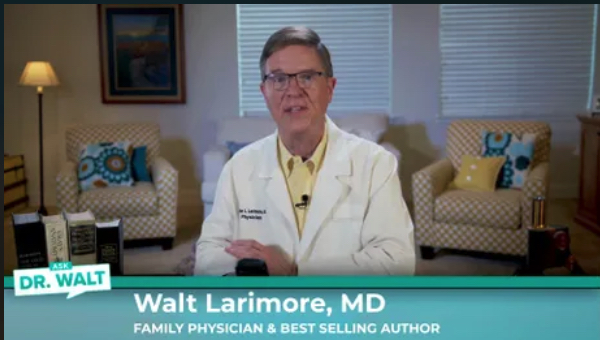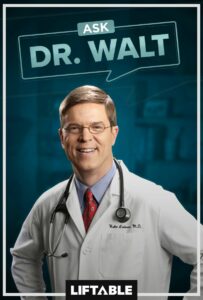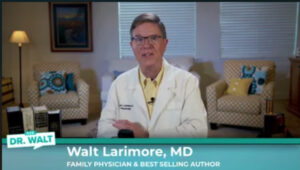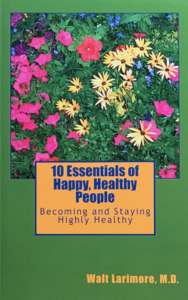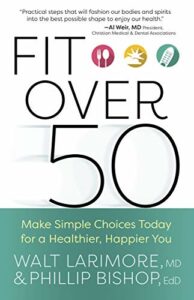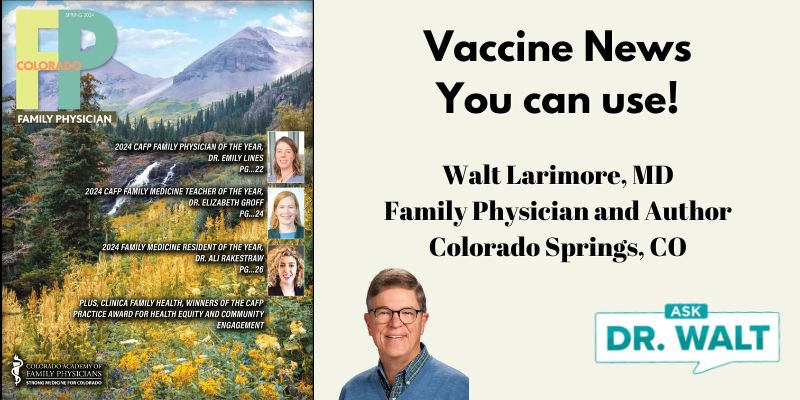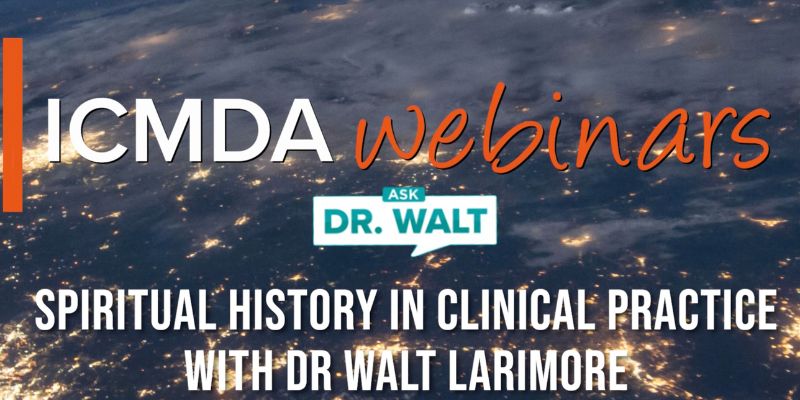Ask Dr. Walt – Episode #5 – 10 Key Habits to Consider and Essential #1 – What is True Health?

The Writer’s Studio 06 – My Interview with Journalist Patricia Raybon (Part 2)
May 19, 2023
Our Pilgrimage to the Holy Land
May 24, 2023Ask Dr. Walt – Episode #5 – 10 Key Habits to Consider and Essential #1 – What is True Health?
In this episode, I’ll break down the 10 key habits or 10 essentials of happy, healthy people and we’ll discuss Essential #1 — What is True Health? You can click below to watch a video of the show, or I’ve put the show transcript at the end of the blog if you’d prefer that.
From 2021-2022, I was honored to host a TV show on LiftableTV, “Ask Dr. Walt.” Today, I’m releasing Episode #5 – 10 Key Habits to Consider and Essential #1 – What is True Health? I hope you’ll enjoy it.
Who doesn’t want to be happy and healthy – well, at least as happy and healthy as you can be? Today we’re going to be talking about true health in this edition of Ask Dr. Walt.
You can learn more about this topic in my best-selling book, 10 Essentials of Happy, Healthy People: Becoming and staying highly healthy or Fit over 50: Make Simple Choices for a Healthier, Happier You.
CLICK HERE FOR 10 E’S CLICK HERE FOR Fo50
Disclaimer: The Ask Dr. Walt show is designed for entertainment purposes to give information on various medical conditions, treatments, and procedures for your personal knowledge and to help you be a more informed consumer of medical and health services.
SHOW TRANSCRIPT
What Is True Health?
TEASE:
Who doesn’t want to be happy and healthy – well, at least as happy and healthy as you can be? Today we’re going to be talking about true health on this edition of Ask Dr. Walt.
OPEN:
Hi, everyone. I’m family physician Dr. Walt Larimore and I’m delighted you are taking the time today to join me in my office. Since our last visit we’ve received a number of questions from you and the one I selected for today’s program came from Maria in Gulfport, Mississippi. She emailed me, as can each of you, at AskDrWalt@LiftableTV.com. She wrote, “Dr. Walt, in several previous programs, you’ve talked about ways we can each be healthier. My question is, ‘How do you define true health.’ I’ve found that my pastor, my doctor, and my therapist all have different definitions. What is yours?”
Maria, this is such an important question that I want to spend most of our time today chatting about what constitutes true health. In one of my best-selling books, 10 Essentials of Happy, Healthy People, I outline ten key habits of people who are very healthy. The first one is:
- The essential of true health—understanding how physical, emotional, relational, and spiritual health work together
The next nine are:
- The essential of self-care—how to be proactive in preventing disease
- The essential of forgiveness—how to practice acceptance and letting go
- The essential of reducing SADness—stress, anxiety, and depression—how to lighten your load
- The essential of relationships—avoid loneliness like the plague
- The essential of spiritual well-being—cultivate a positive spirituality
- The essential of a positive self-image—how to see yourself as your Creator sees you
- The essential of discovering your destiny—how to nurture your hopes and dreams
- The essential of personal responsibility and empowerment—how to become your own healthcare quarterback
- The essential of teamwork in healthcare—how to team up with winning healthcare professionals
Maria, we’ll start with essential number one in this program, and then I’d like to plan to discuss each of the remaining nine in our next nine programs.
Let me start by telling you a story from when I began private practice. I received a call from a young lady who began, “Dr. Larimore, this is Miss Bingingham. I teach the second grade at Bryson City Elementary School over here on School House Hill.”
I was learning that every hill in Bryson City, North Carolina, was named in this manner. My office was at the foot of Hospital Hill. Guess what was on top of that one?
Anyway, it was November 1981. My wife, Barb, who was seven months pregnant, and I, along with our three-year-old daughter, Kate, had just moved to this tiny town of about 900 souls at the southern entrance to Great Smoky Mountains National Park to begin my profession as a family physician.
Miss Bingham said, “Every Thursday we invite someone to give a brief talk to our class. Would you be able to come and talk to the students about health? You know, tell the kids what health is and what they can do to improve their health.”
She caught me off guard. I immediately thought of a thousand excuses. However, before I could verbalize even one, she said, “Doc, I think the kids would really like to meet you, and I know they could learn a lot from you. Won’t you please com7e?”
I was sunk. What excuse could be good enough? “Yes,” I gulped. “I’d be delighted.” My mind started reeling. How could I explain to a bunch of second graders what health is when I wasn’t sure what it was in my own mind? During medical school and residency, I had been taught to recognize and treat diseases. I had very little training in keeping people healthy and even less on how to motivate people to become healthy.
I’ve never forgotten that day, although I don’t have a clue what I said in my little talk. I do remember that the kids listened politely. They even clapped. They asked lots of questions. I think I knew the answers. But even now, more than forty years later, I wonder what they heard. Are they healthier because of their brief time with me? I doubt it. But I am. On that day I began to think more about ways I could promote health, not just treat sickness. I realized I needed to learn more so I could help people gain health and satisfaction in their lives.
Many of the people who came to me for medical care were not very healthy. One of my favorite examples “being unhealthy” comes from the movie “City Slickers,” in the scene where Mitch Robbins, played by comedian Billy Crystal, is asked to make a presentation to his son’s class about his occupation. Instead, he gives a brief speech that describes his view of life and health:
- Value this time in your life, kids, because this is the time in your life when you still have your choices, and it goes by so quickly. When you’re a teenager, you think you can do anything, and you do.
- Your twenties are a blur.
- Thirties? You raise your family, you make a little money, and you think to yourself, “What happened to my twenties?”
- Forties? You grow a little potbelly, you grow another chin, the music starts to get too loud, one of your old girlfriends from high school becomes a grandmother.
- Fifties? You have minor surgery. You’ll call it a procedure, but it’s a surgery.
- Sixties? You’ll have major surgery, the music is still loud, but it doesn’t matter because you can’t hear it anyway.
- Seventies? You and the wife retire to Fort Lauderdale, start eating dinner at two o’clock in the afternoon, you have lunch around ten, breakfast the night before. You spend most of your time wandering around malls looking for the ultimate soft yogurt and muttering, “How come the kids don’t call? How come the kids don’t call?”
- The eighties? You’ll have a major stroke. You end up babbling to some nurse who your wife can’t stand but who you call mama. Any questions?
Can you imagine such a cynical view of life—of health? Yet over the last four decades, I’ve encountered many patients who seem to think pretty much this way. In contrast, the patients who have expanded my understanding of health are those who are vivacious and full of life—and who want to become or stay healthy. They seem to live their lives with purpose, drive, and meaning, regardless of their circumstances.
My patients and the medical literature taught me that true health is far more than just physical. As we discussed in another program, there are four wheels of true health that each must be fully inflated and balanced—and those are your physical healthy, your emotional/mental health, healthy relationships, and spiritual health.
One patient who illustrated this was Terrie, an elementary school librarian. I was her physician for almost sixteen years—from her midlife, through menopause, and on into retirement. During that time, she developed symptoms of diabetes and heart disease. Crippling arthritis slowed her down. Yet she always seemed to be at the top of her game. She had a ‘joie de vivre’—an enjoyment of life. She was physically ill, but extremely healthy emotionally and spiritually as well as having close and healthy relationships with her family, friends, and faith community. If you were to focus only on her list of physical problems, you’d say she had lost her health. Yet I came to realize that Terrie was one of my healthiest patients. She was one of my first teachers of what it means to experience true health—not just disease- and symptom-free but whole health in the most important ways.
Is physical health all there is to health? If you’re just in great physical shape, does that make you healthy by itself? I don’t think so. And I hope by the end of today’s show, you won’t think so either.
I had a patient I’ll call “Cameron.” He was hyper-focused on his physical health. In fact, he’s finished several Ironman triathlons—an amazing physical accomplishment. He was in top physical condition, physically disease-free yet struggling with severe depression. He focused so completely on physical fitness that essentially, he had no friends and no social life. His wife and kids left him, and his business collapsed. Was it healthy for him to be at his physical prime yet unable to care about much of anything emotionally?
For a time, I provided medical care for prisoners in the county jail. Many had bodies that were healthy, yet a few described the sick pleasure they had experienced while beating, or robbing, or murdering someone. Some were totally unrepentant, and I was convinced that if they ever got out, they’d commit another crime. They had disease-free bodies, but were they completely healthy?
My training in conventional medicine initially led me to emphasize the physical side of health, particularly the treatment of trauma and illness. I viewed patients as healthy if they were free from diseases and injuries. But the more experience I gained, the more I could see that having a physically functioning body is not all-important. It isn’t even the main factor in being a highly healthy individual.
So, what, then, is the connection between physical well-being and true health? Before we discuss some steps to achieve this goal, we need to be sure we’ve defined the goal. What is “true health”?
Let’s look at three sources and compare their definitions:
- First, the conclusions of current healthcare providers around the world,
- Second, a few definitions from throughout history, and
- Third, the definition provided by the World Health Organization, a group that has influenced health care around the world since 1948.
- Current Health Care Professionals
In preparing to write one of my first books, 10 Essentials of Happy, Healthy People, I informally surveyed more than a thousand physicians and healthcare experts in many different countries. I asked them two questions:
- “What is health?” and
- “What are the essentials of health?”
After cataloging their surprising responses, I began to search the medical literature from around the world. I reviewed scores of studies and medical reports, many of which I’ll refer to in upcoming shows. I especially examined studies that focused on wellness and longevity. I looked at the histories of men and women who had lived a long time or who lived well in order to discover what kept them in this state of being highly healthy. Their stories and the data I cataloged all revolved around the same themes.
The experts and the published studies agreed that living well and living a long time involves focusing not just on your physical body, but also your emotional, mental, relational, and spiritual well-being.
- Historic Definitions of Health
In medical libraries, there is a great deal of information on how ancient physicians, philosophers, and clergy defined health. I’ve noticed certain trends in writings that go back many centuries.
Our word “health” is said to be derived from an old English word that means “whole.” The definition of health is intended to include those things that “make a person whole.” Obviously, this means much more than just physical well-being.
For example, some ancient writers taught that satisfying work or a vocation that brought joy was compatible with improving health as long as you loved your work and could do it with “enthusiasm.” They also believed that work that is depressing or a downer, to use a modern term, could actually steal from one’s health.
Eighteenth-century authors and theologians taught that a calm temperament—emotional health—combined with a tranquil spirit—spiritual health—is a key to true health. Many associated health with a good sense of humor and an ability to laugh at oneself.
In their attempt to define health, some ancient philosophers and physicians pointed to the Greek word “praus,” which means “gentle,” or “meek,” as a key to health. For example, according to Aristotle, praus had to do with one’s ability to temper or avoid feelings of anger or bitterness, what he called “thymos,” by which he meant a force that boils or wells up or goes up in smoke. To the ancient Greeks, this quality called praus was one’s ability to acquire an even temperament and to be mentally and emotionally healthy. Praus, the Greeks claimed, helped create good health.
In other words, physicians, philosophers, and clerics have, for centuries, believed that to have true health, you needed much more than physical health alone. Healthy work, positive relationships, mental and emotional health, combined with spiritual well-being all contributed to true health.
The World Health Organization’s Definition of Health
In 1948 a modern definition of health was included in the constitution of the fledgling World Health Organization (WHO):
Health is a state of complete physical, mental, and social well-being and not merely the absence of disease or infirmity.
In 1984, the WHO added spirituality to its list of factors necessary for optimum
health. They now say:
Health is a state of complete physical, mental, social, and spiritual well-being and not merely the absence of disease or infirmity.
The WHO definition was, at least in part, created as a reaction against certain modern definitions of health that neglected the emotional, social, and spiritual factors associated with human well-being. I considered the WHO definition of health as being on target. A doctor who practices in an inner-city neighborhood articulates my perspective when she wrote to me:
I think that true health involves our entire beings. The physical, mental, and spiritual elements must all be functioning as God designed them to function if we are to be truly healthy. The physical may actually be the most unimportant of the three because with good mental and spiritual health, we can still be content, even though our bodies may be unhealthy.
As you can see, multiple “authoritative” sources from ancient to modern times indicate that true health is continually defined in terms of physical, emotional, mental, relational, and spiritual well-being. As you’ll learn as you get to know me better, I believe that your spirituality is key to becoming a healthier person and also has a profound effect on your physical, emotional, and relational health—in other words, spiritual health is the power wheel of health.
So, I have a rather bold suggestion to make. I’m going to recommend that, in addition to paying attention to thousands of medical studies, current medical advice, and historical medical wisdom, we also consider a book with proven timeless principles that can be applied in any culture at any time, a book that I use to teach my patients the essentials they need to know in order to become healthy.
Millions around the world refer to it as “The Good Book.” That book is the Bible. “You’ve got to be kidding!” you may be thinking. How can a book that is thousands of years old be of any use in our era of science and modern medicine?
I hope you can accept the idea that to be healthy, you have to think way beyond your body. Looking at what “The Good Book” has to say about health can give us some clues as to what makes up a high degree of overall health.
I admit I’m not a trained theologian, but as a student of the Bible for over forty years, I am familiar with many of its precepts and principles. I have become convinced that this ancient book of wisdom contains timeless principles of health that are supported by scientific research. Let’s take a brief look at what the Bible says about health and healing.
The teaching of the Bible and the miracles of Jesus show that God cares for people’s physical health. One of the best-known examples of Biblical love is the story of the Good Samaritan found in Luke 10:30-37. The Good Samaritan cared for the injured man holistically, including his relational and financial needs. First, the Samaritan bandaged the man’s wounds, poured oil and wine on them, and took the man to a place where he could rest and recover physically.
The Bible teaches that God values our physical bodies. He considers our bodies to be temples, the dwelling place of the Holy Spirit (1 Corinthians 6:19). Paul mentions that physical training has value (1 Timothy 4:8). God is concerned about our physical health.
But in the Bible, health is viewed as more than just physical health—it is viewed as completeness and wholeness. In his book The Bible and Healing, John Wilkinson, a British physician who was both a medical missionary and a biblical scholar, says:
While the Bible appears to say little about health as defined in strictly medical or mental terms, human wholeness or health is the main topic of the Bible. It is only when human beings are whole and their relationships right, that they can be described as truly healthy.3
In other words, health in the Bible is a multifaceted concept. For example, the Hebrew word “shalom,” while sometimes connoting “peace,” is not just “the absence of conflict,” just as health is not just “the absence of disease.” The root meaning of “shalom” is that of wholeness, completeness, and general well-being—but not just physical, emotional, and spiritual well-being. It also carries a strong emphasis on relational well-being, especially with regard to one’s relationship with God. In fact, the Bible teaches that true “shalom” comes only from God. The Bible teaches, “The Lord gives strength to his people; the Lord blesses his people with peace”—with shalom. In other words, the Bible teaches that one cannot be healthy physically, emotionally, and relationally unless one is also growing spiritually.
Also in the ancient Hebrew Scriptures is the word “rapha,” which more than any other word describes the process of healing. The various forms of this word occur at least eighty-six times in the Bible’s Old Testament. The variety of uses of rapha tell us that God’s activity as a healer is not limited to the physical realm. He is depicted as wanting to restore every aspect of a person’s life—including the mental, social, and especially the spiritual.
Some of the Old Testament laws reflect God’s concern for the health of his people and how he expected them to use natural means to promote health. Obeying some of these laws would have promoted health in the same way that public health regulations do today. For example, the Israelites were forbidden to eat meat that we now know was more likely to carry diseases. They were to quarantine people with possible signs of infectious diseases, just as we use certain “isolation techniques” today to prevent the spread of infection (Leviticus 11; 13; 14) like we did in the 2020 COVID pandemic.
The clear teaching of the Old Testament is that good health depends on living one’s life according to God’s will. This produces what the Hebrew scriptures call “tsedeq,” which means “righteousness,” or being in a right relationship with God. This leads to a longer and healthier life.
For example, King Solomon, said to be the wisest man in the world, connected emotions to physical health when he wrote, “A cheerful heart is good medicine, but a crushed spirit dries up the bones.”5
King David poignantly described how guilt over wrongdoing affects physical, spiritual, and emotional health. After committing adultery and murder, David wrote, “When I kept silent, my bones wasted away through my groaning all day long. For day and night, your hand was heavy upon me; my strength was sapped as in the heat of summer.”6
This multidimensional description of health is carried into the New Testament. The apostle John links our overall well-being to our spiritual vitality: “Dear friend, I pray that you may enjoy good health and that all may go well with you, even as your soul is getting along well.”
My main point here is that true health, whole health, and total health, is a major topic in the Bible, and it is viewed primarily as the restoration and strengthening of one’s personal relationship with God. It is also viewed as a healthy lifestyle, physically and emotionally, that focuses on pursuing healthy relationships with your family and with other people.
To my way of thinking, the biblical view on health can be summed up with the word “blessed.” In fact, blessedness is both a theme in the Old Testament and is also clearly described in the New Testament. Perhaps this is most clearly seen in Jesus’ so-called “Sermon on the Mount.”
But, from the beginning to the end, the Bible makes the bold assertion that those who choose to follow the God of the Bible, even when they are not socially, financially, physically, or mentally gifted can and will be blessed by God, not rejected by him, and as a result their overall health is enhanced.
So, to sum up today’s show, I hope I’ve opened your heart and mind to the fact that your overall health depends not just on your physical health, important as that is, but also on your inner life emotionally and spiritually, as well as your relationships. Your Creator has divinely designed you in such a way that if you are willing to concentrate some effort and to follow His principles and guidance, He’ll walk with you to nourish and improve your emotional, relational, and spiritual life, irrespective of your physical health.
Why am I stressing this timeless biblical view? Does it really matter in the twenty-first century? I believe it does. I’ve had many patients who were physically healthy, yet were social, emotional, and spiritual disasters, unable to grasp what it means to be highly healthy. I’ve had patients who have suffered trauma and disease, leading to chronic disability or pain or fatigue, who suffer daily—in ways most of us could not begin to imagine—yet who have been able to develop strategies for experiencing true health. I’ve also had patients and a daughter who live with permanent disabilities from a birth defect or congenital disease, whose prayers for physical healing have not been answered, but whose prayers for true healing have been answered in ways they never would have imagined.
From all this, I have come to believe that being healthy—truly healthy—is not dependent on physical well-being alone. Being healthy means being healthy in every area of your life during every stage of your life. It means being balanced in these areas: body, mind, spirit, and community—what I called in one of my earlier shows the “four wheels” of health.” By balancing these aspects of health, you can become blessed and, thus, healthy.
Even though I’ve introduced you to the four wheels of health—physical, emotional, relational, and spiritual, it is my belief that the wheel connected to the power steering is the spiritual wheel. The Apostle Paul wrote in 1 Timothy 4:8, “For physical training is of some value, but godliness has value for all things, holding promise for both the present life and the life to come.”
For me, centering spiritual faith on following Jesus has innumerable benefits. But fundamentally and most importantly, it restores a person’s relationship with God.
This is healing in the ultimate sense. But Jesus did not come just to bring spiritual healing. The health he offers should impact every aspect of our lives. It allows relational, emotional, and psychological healing. To those who receive him, God promises spiritual reconciliation to become children of God, to be spiritually reborn, to be able to relate intimately with him (John 1:12-13; Revelation 3:20). He also promises ultimate and complete healing (physically, mentally, emotionally, relationally, and spiritually) in heaven. Healing of all our other illnesses and damage is not promised in this life, though it will occur in the afterlife (Revelation 21:4).
Here on earth in this life, Jesus declared that he came to offer health to people in the form of a life on earth that would be full and satisfying and meaningful, coupled with the promise of an eternal life that is disease-free, sin-free, and tear-free. Jesus said, “I have come that they may have life and have it to the full” (John 10:10). I believe Christ’s followers should be real and shining examples of such contented living.
In other words, faith in God can be the beginning of a new way of living and a pathway to true health. Walking closely with God can result in a life filled with “love, joy, peace, patience, kindness, goodness, faithfulness, gentleness and self-control” (Galatians 5:22 – 23). Such contentment is promised regardless of our circumstances, whether we are rich or poor, in sickness or in health. A life characterized by these features is the opposite of the high-stress, discontented rat race many find themselves in. My belief is that a life built on the truth and teachings of Jesus will unleash the true power of faith and true health—despite our circumstances or our suffering.
The Apostle Paul advised those of us who follow Jesus to “Be very careful, then, how you live—not as unwise but as wise” (Ephesians 5:15-16).
So, let me show you a roadmap for our next nine shows. Are you ready for a few surprises? I’m going to share with you many practical and reasonable choices you can make that can improve your and your family’s true health—physically, emotionally, relationally, and spiritually. I’ll be revealing to you some of the latest medical research on true health, as well as the stories and experiences of my patients and some physician friends to illustrate each principle. And, as you can tell, I’ll unashamedly use the health-related principles from “The Good Book”—the Bible—as one of my foundations.
As I mentioned at the top of the program, through my research and writing, as well as my experience in life and four decades of medical practice, I’ve found ten principles that I believe are essential to true health. At first glance, you may suspect that some of these essentials won’t have much impact on your true health. You’re about to discover otherwise.
Today we looked at what true health is—the essential of understanding how physical, emotional, relational, and spiritual health work together. In future episodes, I’d like to address at least nine additional essentials. And I’d like you guys to let me know which of these most interests you. Just drop me an email at AskDrWalt@LiftableTV.com and let me know your first choice. Of course, you can send in any other questions you’d like me to address in future programs also. So, are you ready? Here are the other essentials to choose from:
TODAY WE COVERED:
- The essential of true health—understanding how physical, emotional, relational, and spiritual health work together
WHICH WOULD YOU LIKE TO COVER NEXT?
- The essential of self-care—how to be proactive in preventing disease
- The essential of forgiveness—how to practice acceptance and letting go
- The essential of reducing SADness—stress, anxiety, and depression—how to lighten your load
- The essential of relationships—avoid loneliness like the plague
- The essential of spiritual well-being—cultivate a positive spirituality
- The essential of a positive self-image—how to see yourself as your Creator sees you
- The essential of discovering your destiny—how to nurture your hopes and dreams
- The essential of personal responsibility and empowerment—how to become your own healthcare quarterback
- The essential of teamwork in healthcare—how to team up with winning healthcare professionals
In addition, you can read more about these 10 Essentials in two books that you can find on my website, www.DrWalt.com. One is Fit over 50: Make Simple Choices for a Healthier, Happier You and the other is 10 Essentials of Happy, Healthy People: Becoming and staying highly healthy.
I believe these essentials are divinely designed and programmed into the very core of our beings. If you understand them and learn to apply them in your life, you will be taking the first steps to experiencing true health—health to improve and lengthen your life now and that can provide eternal life as a benefit. Putting into practice the essentials I’ll be explaining to you is . . . well . . . essential to true health.
Don’t forget to vote on our next program. So, until our next visit, let’s get moving together toward true health, and “Dear friend, I pray that you may enjoy good health and that all may go well with you, even as your soul is getting along well.”
Disclaimer: The “Ask Dr. Walt” show is designed for entertainment purposes to give information on various medical conditions, treatments, and procedures for your personal knowledge and to help you be a more informed consumer of medical and health services.
© Copyright WLL, INC. 2023. This blog provides healthcare tips and advice you can trust about a wide variety of general health information only and is not intended to substitute for professional medical advice, diagnosis, or treatment from your regular physician. If you are concerned about your health, take what you learn from this blog and meet with your personal doctor to discuss your concerns.

